Meet The 2023 Southerners Of The Year
- Oops!Something went wrong.Please try again later.
The trailblazers supporting and preserving our region’s people, places, and traditions

As we wrap up another year, we wanted to take a moment to celebrate the unsung heroes who make communities across the South a better place to live. These trailblazers are preserving the rich history of this region and its people, protecting natural resources and wildlife, inspiring younger generations to follow examples of selfless service, and feeding those in need. These Southerners of the Year do this work day in and day out without seeking recognition but rather driven purely by the passion to make a difference and a shared compassion for their neighbors. This year’s honorees hail from Alabama, Missouri, North Carolina, South Carolina, and Tennessee. We are honored to share their stories and hope that many others will be inspired by their work.
Related: 2022 Southerners of the Year: Citizens of Mayfield, Kentucky
Loretta Pettway Bennett
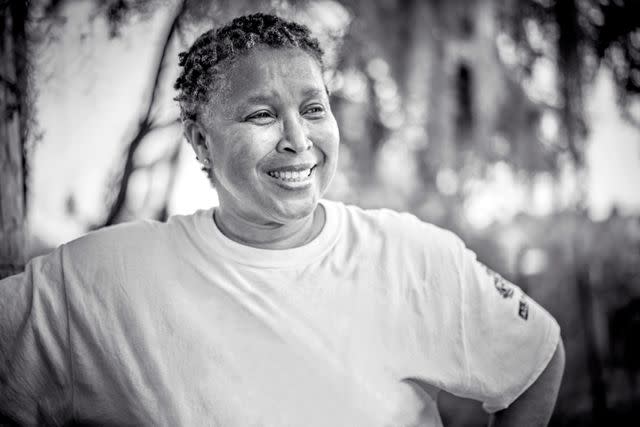
Steve Pitkin/Pitkin Studio
Loretta Pettway Bennett shares the story of Alabama's legendary quilters and continues their work.Freedom Quilting Bee Legacy
Alberta, Alabama
Freedom Quilting Bee Legacy board member Loretta Pettway Bennett was just 6 years old when the original Freedom Quilting Bee (FQB) collective was formed in 1966 in rural Alberta, Alabama. She says by that point, she was already stitching together “whatever little scraps of fabric” she could find. “The women were always sewing something,” Bennett recalls of her childhood in nearby Gee’s Bend (also known as Boykin). “It has always been a part of my life.”
The collective was also where Bennett’s mother, Qunnie, had her first paying job. When the FQB was founded in the sixties, Black people in Alberta and Gee’s Bend were being fired and evicted for registering to vote. Civil rights activists helped the local women use the vibrant blankets that they had already been making for generations as a way to support themselves. With money soon rolling in from clients like Saks Fifth Avenue and Sears, the FQB gave them the ability to provide for their families, install plumbing in their homes, and even go to college.
The organization officially closed in 2011, and as the building crumbled, so did the tradition of quilting. Though it lived on through some of the older residents, the memory of the women who made history with needles and thread was fading.
Bennett still sews every day, and her quilts have been displayed in more than a dozen museums and galleries around the world. But what she’s proudest of is her work with FQB Legacy, a nonprofit that’s dedicated to bringing attention to the original members and artists—innovative and resilient women like her mom, grandmothers, aunts, and neighbors.
FQB Legacy was established in 2021 with the goal of repairing the original building and transforming it into an educational destination. It reopened as a museum in October of 2022. The organization hosts sewing classes and events aimed at remembering the past while creating new opportunities for the future. “[Quilting] is an inheritance that we were given,” Bennett says. “We need to continue the tradition of sewing and making things with our hands. Most people don’t have wealth or jewelry to pass on, but at least we have a craft.”
In the process, FQB Legacy is helping bring the community back together, much like creating a quilt. “I hope, more than anything, that it gives them something to be proud of,” Bennett explains. “They come from a rich legacy.”
Vanderbilt University Athletics
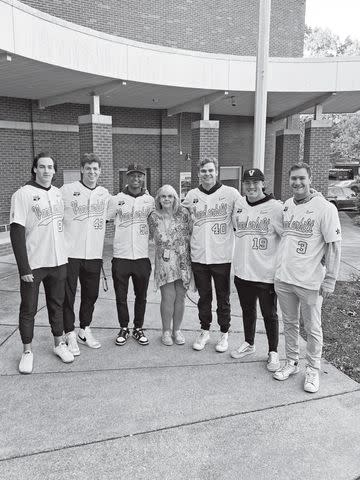
Courtesy Vanderbilt University Athletics
In Nashville, Vanderbilt University's athletes support a local elementary school and get students excited about learning.Nashville, Tennessee
In the shadow of Vanderbilt University sits Nashville’s Eakin Elementary School. “You can literally see the athletic facilities from our library window,” says executive principal Eric Hartfelder. “When there are football games, we have parking at our school.”
Yet Eakin has a relationship with Vanderbilt that extends beyond proximity. Last year, Hartfelder noticed that kids were showing up late in the mornings, so he began enticing them with the opportunity to spend time with Vanderbilt’s famous baseball players before the first bell.
Hartfelder says that having the athletes there waiting with smiles and high fives has transformed mornings at the school. “Kids are helping push their parents out the door,” he notes. “The day begins with a fun interaction that makes them feel important. We provide more than an education; we provide a childhood. That all starts with getting everyone into school early, excited, and ready to learn.”
Women’s basketball guard and Nashville native Jordyn Cambridge spends an hour or two each week at Eakin. When possible, she and her teammates will join in pickup games during PE. “It gets competitive,” she says, laughing. Cambridge, a former member of the All-SEC Defensive Team, loves being a role model. “I want them to follow after me, do things better than me, and become whoever they want to be when they grow up,” she says.
Hartfelder feels similarly. “I want our students to see people doing great things so they know they can too,” he says.
Katie Stagliano
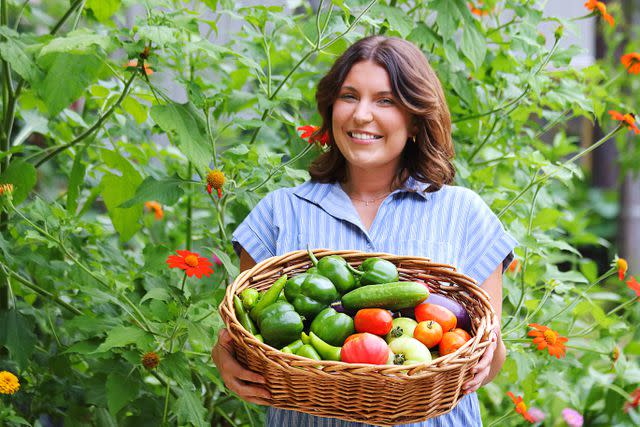
Katie's Krops
Katie Stagliano was just a third grader when she dreamed up her gardening nonprofit for young people.Katie's Krops
Summerville, South Carolina
Katie Stagliano found her calling at 9 years old when her third-grade teacher sent her home with a seedling for the backyard. Her tiny plant grew into a 40-pound cabbage. “I was shocked because I didn’t know they could get that big. But I realized that this one was far too large for my family to eat,” she says. Every night, her father would remind them just how lucky they were to sit down to a healthy dinner when some people were not able to.
“That’s how I got the idea that changed my life forever,” she says. “I donated my cabbage to a soup kitchen to help feed those who might not otherwise have a meal.” The director of the kitchen invited her to serve her cabbage in a soup with ham and rice. Stagliano remembers how surprised she was to see how many families just like hers were waiting in line for a meal. Because that one vegetable served 275 guests, she thought, “How many people could a garden feed?”
With the support of her parents, she launched Katie’s Krops. The idea took off when her school gave her a plot of land the size of a football field. Soon, the whole student body was involved. Katie’s Krops became an official nonprofit, and her message began to spread. Kids across the country reached out wanting to start their own gardens, so the organization began offering funding and support to Katie’s Krops Growers between the ages of 7 and 16.
Today, at 25 years old, Stagliano is at the helm of a project that includes 100 gardens in 33 states. Collectively, Katie’s Krops has donated around 600,000 pounds of produce—with no plans of slowing down. Stagliano says, “I would love to reach all 50 states and eventually expand internationally.”
Meg Puckett
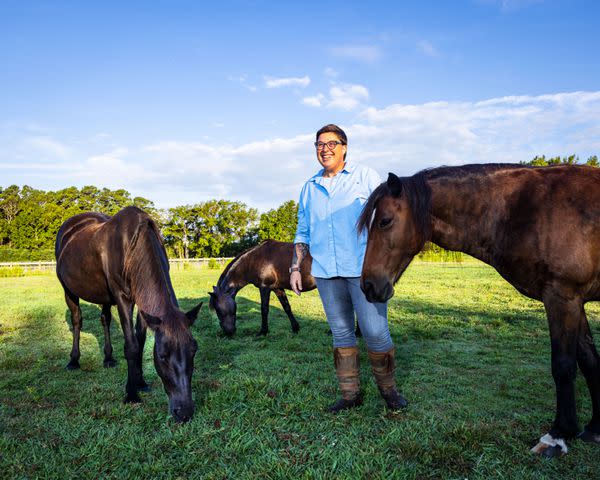
Robbie Caponetto
North Carolina's wild horses are being saved thanks to Meg Puckett.Corolla Wild Horse Fund
Corolla, North Carolina
As the herd manager for the Corolla Wild Horse Fund (CWHF), Meg Puckett is the face of the most famous herd on the Outer Banks. It’s a big job. Since 2016, she’s been on call 24-7, though she says she loves every “sweaty, heartbreaking” moment of it. The Banker mustangs have become her life, and working with them means so much to her that she sometimes struggles to speak about it without crying.
Preserving these treasured animals amid an endless stream of tourists is a complicated dance. Puckett likes to say that “it takes a village,” but it also takes education, which is where Facebook comes in. She uses CWHF’s page to provide an unfiltered look at all that goes into caring for the more than 100 wild horses as well as the struggles they face on a daily basis. It’s not always pretty, but that is often the point.
Puckett considers the fund’s ongoing program with the Equus Survival Trust to be her greatest accomplishment on behalf of the herd. CWHF collects DNA to be processed and analyzed to better understand the breed and its 500-year history. They’ve even mapped out family trees and, with help from NC State University, started a sperm bank.
In just a few years, this research has elevated the work of CWHF in the eyes of the scientific community. As Puckett puts it, these animals have always been special, but now there’s proof. With this data, CWHF can accomplish its goals of maintaining the mustangs’ natural environment and keeping them wild. Puckett says, “The research has established them as an endangered breed worth saving.”
Stan Hays
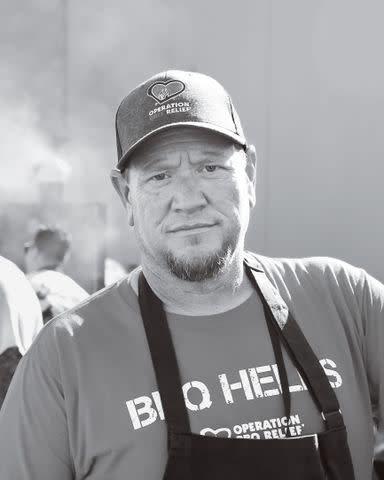
Courtesy Krista Carpenter-Beasley
Pitmaster Stan Hays provides disaster relief in the form of barbecue.Operation BBQ Relief
Kansas City, Missouri
In 2011, Stan Hays had a nine-to-five job with an insurance company and participated in barbecue competitions on the weekends. But on May 22 of that year, everything changed. An EF5 tornado struck Joplin, Missouri, just a few hours from his home in the Kansas City area. Hays and his family were watching the coverage on TV in horror as the tornado, which measured up to a mile wide, tore apart buildings and toppled trees in a 6-mile stretch of town. “I just remember how helpless I felt,” Hays says.
The next morning, as he headed off to work, his wife said something that would forever alter their lives. “She told me, ‘You should really go get the barbecue guys that you compete against and cook for the community of Joplin,’ ” Hays recalls. He had made it only about 3 miles into his commute when he called his barbecue mentor Jeff Stith. Together, they reached out to a group of their fellow competitors to ask if they wanted to join forces and use the power of ’cue for good.
That afternoon, Hays loaded up his gear and headed to Joplin. Just two days after the tornado struck, pitmasters from nine states joined him to feed those who had been affected. In 13 days, they served more than 120,000 meals, and Operation BBQ Relief (OBR) was born. In 2018, the nonprofit became Hays’ full-time job.
Over the past 12 years, Hays and his team have shown up in the wake of all kinds of disasters—tornadoes, hurricanes, floods, explosions—and set up their smokers to feed those in need. To date, OBR has provided over 10 million meals. Hays says, “At the end of the day, it’s about comfort food. From the smells to the camaraderie, barbecue serves as a reminder that good times will happen again.”
For more Southern Living news, make sure to sign up for our newsletter!
Read the original article on Southern Living.

